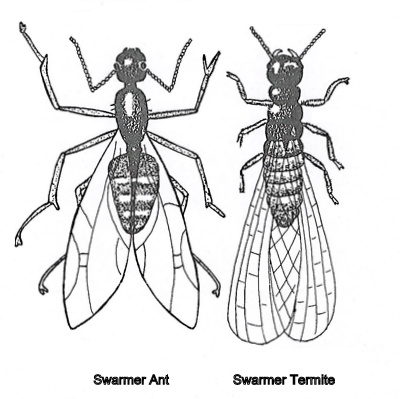Termite

- Q: What is the difference between flying ants and flying termites?
-
- An ant has a pinched or narrower waist, whereas a termite’s body is one width.
- An ant has bent antenna, whereas a termite has straight antenna.
- Ants have a pair of longer wings on top of shorter wings, whereas a termite has a pair of equal sized wings.
- In the case of our native subterranean termites, their bodies will usually be jet black, whereas ant swarmers can be any color from red to brown, or any combination of colors.
- Q: What are the visible signs of termites?
- The most common sign are swarmers. These winged termites leave the nest in early spring to establish new colonies. Other signs could include small exit holes in sheetrock or trim, presence of dirt tunnels, or presence of swarmer wings on windowsills or the floor.
- Q: I don't see any of the signs. Should I still be concerned?
- YES! Termites have a natural aversion to sunlight and air. For this reason they usually tunnel up through wall voids and other unseen areas. The Department of Agriculture reports that there are several active termite colonies per acre in this region of the country. Sometimes even pest management professionals (PMP) miss termites in these hidden areas.
- Q: Is there anything I can do to help prevent termites?
- YES. Keep firewood off the ground and away from the house. The crawlspace floor should be free of any cellulose (wood) debris. This includes cardboard and other paper. The crawlspace should be kept dry using proper ventilation and a moisture barrier. Also, ensure water does not stand in the crawlspace or around the house.
- Q: Then will I be safe from termites?
- No. Termites are unpredictable and aggressive feeders. Chances are eventually an unprotected home will be found and attacked. Only a proper termite treatment can prevent this.
- Q: I received a letter stating my warranty expired. Why is more treatment necessary?
- No termiticide lasts forever. Some last longer than others, so to keep your home protected we recommend periodic retreats, usually in 10 year increments.
- Q: Do baiting systems work?
- Some are very effective and some are not. Bait that relies on a stomach poison is only going to kill the termites that feed on the bait. This triggers an alarm from the remaining termites and they will avoid the bait. The most effective termite baits use a chitin inhibitor, which prevents the termites from molting and thus they die out. Some bait is also transferred from termite to termite by contact and through a process called trophollaxis, in which members of the colony feed the other members from what is in their belly. The baits can be very effective at eliminating entire colonies because they do not associate the bait with the colony elimination.
- Q: So should I use bait or a liquid?
- Each structure is a different scenario. In some cases either one might be more effective. Your PMP (pest management professional) will give you their best recommendations.
- Q: Is it true if I have ants, I probably have termites?
- No. Ants do use termites as a food source but the mere presence of ants should not worry you. If you are suspicious, call a professional.
- Q: I have regular pest control service. Will this help with termites?
- No. A termite treatment is completely different from pest control treatment. While termite chemicals are placed underground to destroy foraging workers, pest control chemicals are usually on the exposed soil or other areas above ground.
